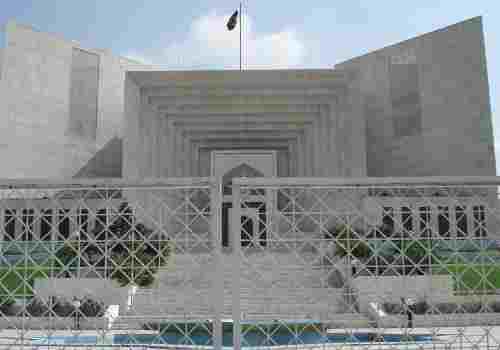ISLAMABAD: The Supreme Court has retained its decision on the petitions challenging the military trial of civilians involved in the May 9 riots, which were sparked by the arrest of Pakistan Tehreek-e-Insaf (PTI) leader Imran Khan in a corruption case.
A five-member bench of the apex court, led by Justice Ijaz Ul Ahsan and including Justices Munib Akhtar, Yahya Afridi, Sayyed Mazahar Ali Akbar Naqvi, and Ayesha Malik, heard the petitions filed by PTI chief and others on Monday.
The decision to retain the verdict came after Attorney General of Pakistan (AGP) Mansoor Usman Awan concluded his arguments regarding the jurisdiction and scope of military courts in trying civilians under the Army Act.
At the start of the hearing, petitioner lawyer Salman Akram Raja informed the bench that trials of civilians had already begun before the top court’s ruling on the matter.
In response, Justice Ahsan stated that the method of conducting the case proceedings would be determined after Attorney General of Pakistan (AGP) Mansoor Usman Awan completed his arguments.
AGP Awan, presenting his arguments, explained to the court the necessity of a constitutional amendment in 2015 to establish military courts for trying terrorists. In response to Justice Ahsan’s inquiry, AGP Awan noted that the accused tried in military courts included both local and foreign nationals. He further clarified that the accused would be tried under Section 2(1)(D) of the Official Secrets Act, and a trial under the Army Act would satisfy the requirements of a criminal case.
AGP Awan stated that the 21st Amendment was enacted because terrorists did not fall under the purview of the Army Act. Inquiring further, Justice Ahsan questioned whether the amendment was needed for civilians and whether the accused had attacked the army or installations at the time of the 21st constitutional amendment.
AGP Awan replied that the 21st Amendment included a provision for trying accused individuals involved in attacking restricted areas. Justice Ahsan sought clarification on how civilians fell under the jurisdiction of the Army Act.
Justice Malik asked AGP Awan to explain Article 8 of the Constitution. AGP Awan responded that Article 8 stipulated that legislation against fundamental rights could not be sustained. Justice Malik observed that the Army Act aimed to establish discipline within the armed forces and questioned how it could be applied to civilians.
AGP Awan responded by distinguishing between the internal matter of discipline within the armed forces and the obstruction of armed forces from performing their duties, stating that individuals facing charges under the Army Act could be tried in military courts. Justice Ahsan remarked that the laws referred to by AGP were related to army discipline. Justice Malik raised concerns about leaving the provision of fundamental rights to the discretion of Parliament, emphasizing the Constitution’s commitment to ensuring fundamental rights at all costs.
The AGP informed the bench that court-martial was not an established court under Article 175 of the Constitution. Justice Ahsan clarified that court-martials were not governed by Article 175 but were courts established under the Constitution and the Law.
Following the arguments, the bench retained the verdict on the petitions. The day before, the federal government had informed the apex court that military trials of civilians had already commenced. After concluding the hearing, Justice Ahsan hinted at issuing a brief order on the petitions.
On the same day, nine of the May 9 suspects, who were currently in the army’s custody, expressed their “faith and confidence” in military authorities and moved the Supreme Court, seeking an order to expedite their trial in the military court to “meet the ends of justice.” Nine out of more than 100 suspects in army custody filed their petitions in the apex court through an advocate-on-record.
The May 9 riots had erupted across the country following the arrest of former Prime Minister Imran Khan, who was removed from office through a vote of no confidence in April the previous year, in connection with a £190 million settlement case. Hundreds of PTI workers and senior leaders were imprisoned for their involvement in violence and attacks on military installations.
(Islamabad51_Newsdesk)














